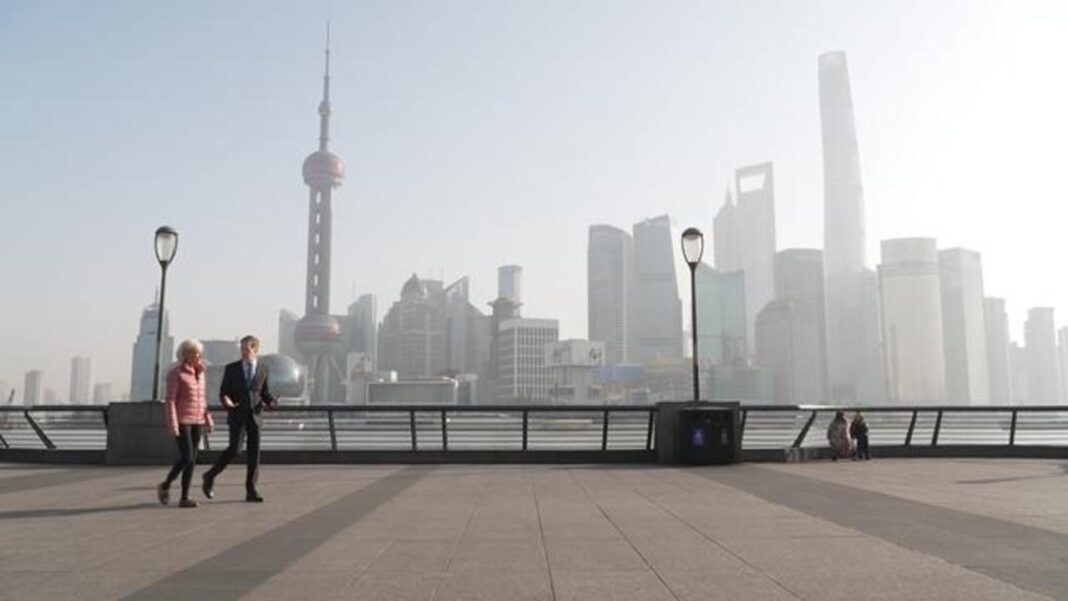American CEOs used to swoon over China. Its vast pool of consumers has been a magnetic draw for decades. But doing business there has become so fraught and risky – with intellectual property theft and an expanded espionage law used to intimidate the business community – that U.S. companies have pressed the pause button.
On top of that, the U.S.-China relationship has become contentious due partly to Beijing’s belligerent activity toward Taiwan and in the South China Sea, the balloon spy incident of last year, and the list goes on.
Making matters worse, the Chinese economy has hit a wall: export growth is slowing, the country’s drowning in debt, and youth unemployment has soared.
Getting into China to tell that story is all but impossible for most Western journalists.
But when the U.S. ambassador, Nicholas Burns, invited us to come for a visit and an interview, we were granted visas. We spoke with him at his residence in Beijing.
Nicholas Burns: More money is leaving China for the first time in 40 years than is coming in from American, Japanese, European, Korean investors.
60 MINUTES – NEWSMAKERS
China’s slowing economy, Xi’s government tactics leave American investors wary
60-minutes
By Lesley Stahl
February 25, 2024 / 7:00 PM EST / CBS News
American CEOs used to swoon over China. Its vast pool of consumers has been a magnetic draw for decades. But doing business there has become so fraught and risky – with intellectual property theft and an expanded espionage law used to intimidate the business community – that U.S. companies have pressed the pause button.
On top of that, the U.S.-China relationship has become contentious due partly to Beijing’s belligerent activity toward Taiwan and in the South China Sea, the balloon spy incident of last year, and the list goes on.
Making matters worse, the Chinese economy has hit a wall: export growth is slowing, the country’s drowning in debt, and youth unemployment has soared.
Getting into China to tell that story is all but impossible for most Western journalists.
But when the U.S. ambassador, Nicholas Burns, invited us to come for a visit and an interview, we were granted visas. We spoke with him at his residence in Beijing.
Nicholas Burns: More money is leaving China for the first time in 40 years than is coming in from American, Japanese, European, Korean investors.
U.S. Ambassador to China Nicholas Burns
U.S. Ambassador to China Nicholas Burns
60 MINUTES
Lesley Stahl: Now why is that? And how much of a problem is that for them?
Nicholas Burns: That’s a real problem for this economy. They have 1.4 billion people here. They’ve gotta keep it growing, and foreign capital is important. You ask why. I think there’s been a contradiction in the messaging from the government here in China to the rest of the world. On the one hand, they say, “We’re open for business. We want American, Chi– Japanese businesses here.” But on the other hand, they’ve raided six or seven American businesses since last March.
Lesley Stahl: Raided?
Nicholas Burns: Raided. They’ve gone into American companies and shut them down and made accusations we believe are very much unwarranted.
The American companies include Bain & Company and— the Mintz Group, a company that does due diligence for other companies that might want to invest here, was raided last year. Five of its Chinese employees were taken into custody, and they’re still there.
Another firm, Capvision, was raided. Lest the message wasn’t loud and clear, a report about it was put on state-run television.
It accused Western consulting firms of espionage and stealing national security and military secrets.
Lesley Stahl: They want the investment to come back and they’re raiding American companies? And they’re–
Nicholas Burns: Yes. They’ve passed an amendment to their counter-espionage law and it’s written in such a general way that it could be that American business people could be accused of espionage for engaging in practices that are perfectly legal and acceptable everywhere else in the world– collecting data to do due diligence so that you can decide whether you want to invest in a company or form a joint venture, right?
Lesley Stahl: What do you think the Chinese are afraid that these companies are gonna find out, these due diligence companies? What are they worrying about?
Nicholas Burns: You know, I think they want to control data about the Chinese people, about Chinese companies. And so– that I think is at the heart of the problem with those American companies operating in that sphere.
Ambassador Burns told us that’s just one of the concerns he hears about.
Nicholas Burns: There is still intellectual property theft from American companies here.
Lesley Stahl: Is every American company afraid of that?
Nicholas Burns: Yes.
All kinds of U.S. companies began flocking to China in the early 1980s after the country opened to the West under then-leader Deng Xiaoping.
And now, U.S. banks operate here. Walmart has more than 300 stores across the country. Shoppers, here in Shanghai, can buy Levi’s, browse in an Apple store, and get a caramel frappuccino.
Nicholas Burns: Starbucks has 6,000 stores in China, 1,000 stores in Shanghai, and they want to keep building because coffee–this was a tea culture—
Lesley Stahl: Right, yeah.
Nicholas Burns: –for hundreds of years. It’s now becoming, at least with the young Chinese, a coffee culture, and—
Lesley Stahl: And they love Starbucks?
Nicholas Burns: They love Starbucks. And I’ll buy you a cappuccino.
Lesley Stahl: I’ll take one, thank you.
Boeing’s here. So is Tesla, Pfizer, Chevron, Intel. But while some businesses are thriving, many of the foreign companies are worried about the business climate under President Xi Jinping.
Nicholas Burns: If you track China from the death of Mao to the opening of China to the world, we’ve seen a closing of sorts. We’ve seen a centralization of power of the Party. We’ve seen increased repression of the people of China here. That’s a very significant trend just over the last decade.
Lesley Stahl: With Xi.
Nicholas Burns: Under his leadership.
Part of that trend includes President Xi’s reversing many of the market reforms that unleashed China’s economic miracle.
Nicholas Burns: They’ve been growing over 40 years, the fastest growth rate in recorded economic history–8, 9, 10, 11% growth rates. They’ve lifted 800 million people out of poverty. But what’s happening is that growth rate is slowing down. Most economists are now projecting [that] they’ll be at 2, 3, 4% growth, maybe even lower in the next decade–
Lesley Stahl: Can they support their society if it’s that low?
Nicholas Burns: That’s gonna be difficult for them.
Lesley Stahl: If there was so much explosive growth– if so many people were lifted out of poverty, why is he turning away from what worked?
Nicholas Burns: Well, I think they’ve got maybe competing priorities. The government here in China certainly wants the economy to grow, but they also have a national security mindset. They want to control data. They want to–
Lesley Stahl: But that’s more important, the control, right? Than economic growth. It seems that way.
Nicholas Burns: I think it’s open for debate. You’re hearing, we are hearing both messages.
Lesley Stahl: It sounds as if you yourself don’t know the direction it’s going.
Nicholas Burns: What I perceive here is that the greater energy is with those on the national security side of the government of China.
Nicholas Burns: Good morning, how are you?
On a train trip from Beijing to Shanghai, the ambassador pointed out that in the decades before President Xi, China powered its economy by investing in these high-speed trains, roads, factories, and skyscrapers that light up Shanghai–the financial capital of China.
But under President Xi, China lost more than $120 billion worth of long-term foreign investments last year because of the weakening economy and the harsh government tactics, which have left American companies uncertain of the future there.
Lesley Stahl: There are a lot of American companies here. Have a lot of them just picked up and left because of this current business environment?
Nicholas Burns: You know, that’s interesting, not many.
Lesley Stahl: Not many.
Nicholas Burns: Not many.
Lesley Stahl: Why not?
Nicholas Burns: China is the second largest economy in the world. It’s a big market. So, a few American companies have left, but most have stayed.
Some American companies are moving at least some of their operations to Singapore, Vietnam, Mexico.
Lesley Stahl: But they’re not leaving China. The market’s so–
Nicholas Burns: They don’t want to leave.
Lesley Stahl: –irresistible to American business people. It’s gigantic.
Nicholas Burns: Maybe they’re not leaving, but they’re not investing, they’re not making major investments until they can see exactly where the government is headed.
Yet, because of the 1.4 billion potential consumers, some companies, like Disney, are increasing their investment.
Shanghai Disneyland loudspeaker: “Welcome to Shanghai Disney Resort.”
It recently expanded its Shanghai Disneyland that they told us is thriving.
Aptar, a $9 billion company headquartered in Crystal Lake, Illinois, is another American firm bucking the trend of capital flight.
President of Aptar Asia, Xiangwei Gong, a Chinese-born U.S. citizen, showed us around one of their five manufacturing sites in China.
Xiangwei Gong: We are manufacturing for some of the largest U.S. brands– actually, U.S. consumer brands.
This factory makes the packaging and dispensing devices for food, pharmaceutical, and beauty products sold in Asia.
Xiangwei Gong: All of our customers like P&G, L’Oréal, Estée Lauder, they’re all here doing business.
Aptar, in China for nearly 30 years, recently invested $60 million in a new factory. Xiangwei Gong says even in a slowing economy, the company is doing well.
Lesley Stahl: American companies here, as the Ambassador well knows, are pausing or cutting back on investment, but not this firm. You’re expanding.
Xiangwei Gong: Well, because we are here for the long-term and we believe in the consumption power of the rising middle class. It’s 1.4 billion people here. And, imagine, for– for example, healthcare. And the same with cosmetics and beauty and beverage. All– all those sectors–packaged foods–these are really the biggest markets. And so– so we are very confident about the long-term.
Lesley Stahl: What does it say about the confidence, really, in the U.S.-China relationship? It– it seems to say you believe that– that things will what? I’m asking, get better?
Xiangwei Gong: That’s a great question for the Ambassador. I believe so, I hope so.
Nicholas Burns: You know, we’ll see.
Actually, Burns says he’s wary of the future as the fundamental rivalry and mistrust between the U.S. and China is shaking the confidence of the business world and has pushed our relationship to its lowest point in half a century.
Lesley Stahl: Is it our most competitive relationship in the world right now?
Nicholas Burns: This is the most important, most competitive, and most dangerous relationship that the United States has in the world right now and will, I think, for the next decade or so.
Lesley Stahl: I want to quote you back to you, and tell us what you meant. You have said, “Divorce is not an option.”
Nicholas Burns: Right. Our two countries have to live together. And this, I think, is the greatest tension in the U.S.-China relationship. China’s our most significant competitor, and at the same time, China is our third largest trade partner–750,000 American jobs at stake. Agriculture- China’s the largest market for U.S. agriculture. One fifth of all of our export ag– products from agriculture are sent to China. That was $40.9 billion last year.
Lesley Stahl: So we can’t afford really to have a real break here.
Nicholas Burns: Well, it’s complicated.
Lesley Stahl: All those jobs would–
Nicholas Burns: It’s complicated. Some people are saying, “Well, we’re so competitive with China, we should end the economic relationship.” Well, the consequence of that would be 750,000 American families wouldn’t be able to put dinner on the table. And so this makes for an extraordinarily difficult balancing act in my job.
Lesley Stahl: You’re a Wallenda brother.
Nicholas Burns: I’ve never thought of myself that way, but high wire–
Lesley Stahl: But you’re up on that tightrope.
Nicholas Burns: Right. Well, we have– we have competing interests here, and balancing those interests is the reality in the U.S.-China relationship. We’re gonna compete. We have to compete responsibly and keep the peace between our countries. But we also have to engage.
One in every five people in the world is Chinese; China’s population is four times that of the U.S. and the country is vast: 3.7 million square miles. It overlooks the Taiwan Strait, where half the world’s trade flows every day, and is located about 100 miles away from Taiwan.
President Xi likes to say that the East is rising, the West is declining, but economically, the U.S. is thriving compared to China. In December, Moody’s, the credit rating agency, cut its outlook for China to “negative.” And it’s facing a long-term demographic bind: a decline in the birth rate that experts say is irreversible, meaning the country is both aging and shrinking.
Ambassador Nicholas Burns took us on a tour, starting in Beijing.
The ambassador and his wife Libby like to take early morning walks through a park near their residence.
Nicholas Burns: This is a 600-year-old Ming Dynasty park called Ritan Park. It’s a place for a lotta retirees and a lot of young people, and it’s tremendously active.
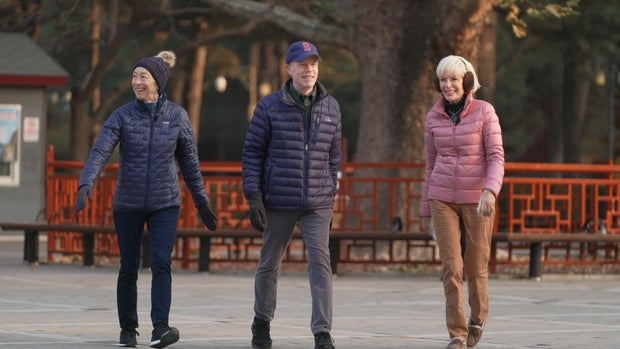
It’s where the locals come for their early morning routines like Tai Chi, yo-yo-ing, and ping pong.
Nicholas Burns: Oops!
You couldn’t tell from these scenes–
Nicholas Burns: Whoa!
–that China, where the COVID pandemic began, is still emerging from the trauma of President Xi Jinping’s oppressive zero-COVID policy.
Burns, 68, a career diplomat who has served in both Republican and Democratic administrations, got to China at the height of the zero-COVID lockdowns and quarantines.
Nicholas Burns: When my wife Libby and I arrived here in early March of 2022, we were quarantined in this house for 21 days, for three weeks. Shanghai, a city of 26 million people, was completely locked down for 63 days–
Lesley Stahl: What was– what was that like, in the city–
Nicholas Burns: Well, we had women who needed to give birth and we had to find a way to get them to the hospital. We had Americans who wanted to get out but had to find a way out of their locked compounds to the airport. So, zero-COVID worked for a while. In ’20 and ’21, they had very low, or relatively lower, infection rates. But by 2022, it had really divided this society.
It set off rare, widespread protests. Then in December of 2022, President Xi ended the policy abruptly.
Joerg Wuttke: The last thing this government is gonna accept here is volatility.
Volatility is something Joerg Wuttke, a German businessman, who’s lived and worked in China for over 30 years, hadn’t seen since the Tiananmen Square uprising in 1989. He represents BASF, the world’s largest chemical producer.
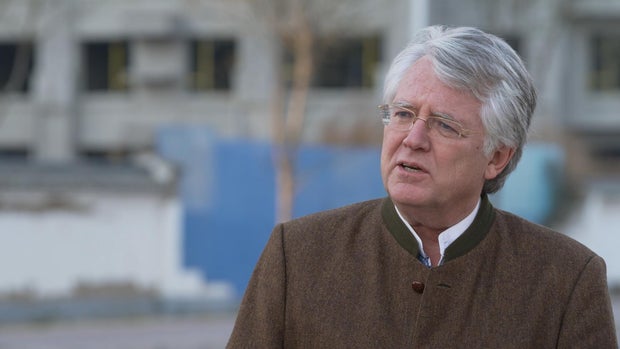
Lesley Stahl: You have said this is a PTSD country, post-traumatic stress disorder country. What– what do you mean?
Joerg Wuttke: Well, everybody has been traumatized by the lockdowns that took place in many cities across China. And the kind of messaging that came out of the leadership: “It’s for your own safety.” And then the lockdown was lifted– actually it was more a capitulation from the government. The lockdown basically left. And– and like a tsunami–
Lesley Stahl: They said, “We were wrong. We’re gonna lift it?”
Joerg Wuttke: They never said they were wrong. That’s not the system to s– admit that they did something wrong. And then you basically, like a tsunami, COVID was rolling across the country.
Lesley Stahl: After they lifted it?
Joerg Wuttke: December, January, I would say a billion people were infected. And certainly lots of people died.
Independent analysts say that an estimated 1.4 million people died.
Joerg Wuttke: This kind of environment really changes your attitude towards life. And then business, we thought we’re gonna have a comeback story. And we had a good couple of weeks. And then the economy basically has been flat since.
Lesley Stahl: You know, after COVID in the West, in the United States particularly, we did have a huge, quick rebound. Why didn’t it happen here?
Joerg Wuttke: Well, I think that COVID also has covered up a couple of long-term problems that China has been building up. For example, in the real estate sector.
We reported on the real estate sector 10 years ago with astonishing sights like this–of empty buildings in city after city across the country.
This is today. Similar hollowed-out wastelands of unoccupied and unfinished apartments known as ghost cities.
Lesley Stahl: When I was here 10 years ago, I never expected to see these buildings still here.
What was a housing bubble back then grew and finally exploded. This real estate crisis lies at the heart of China’s economic decline.
Lesley Stahl: Has anybody counted up the number of empty units, I mean, across the whole country?
Joerg Wuttke: Well, the whole of Germany, we have 82 million people, could move in here right away, 80– 80 to 90 million apartments are empty.
Lesley Stahl: 80 to 90 million apartments–
Joerg Wuttke: Yes, at least.
Lesley Stahl: –are empty?
Joerg Wuttke: Right, unfinished.
Over the years, Chinese banks readily loaned money to the developers as the building boom created millions of jobs and propelled China’s growth.
But in 2020 the government, under President Xi, clamped down on the rampant borrowing, causing the major developers to default on their loans and run out of money.
Lesley Stahl: Look at that. The facade isn’t even finished –
Joerg Wuttke: Yeah, yeah.
He says they couldn’t even afford to take down the cranes. In January, Evergrande, once China’s largest developer, was ordered to liquidate its remaining assets.
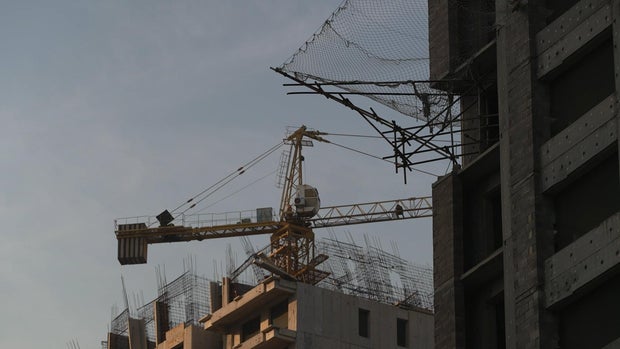
Left in the lurch are millions of Chinese citizens who bought these apartments before they were built.
Joerg Wuttke: The developers owe their customers that paid up to the magnitude of $1 trillion.
Lesley Stahl: So, if I did a down payment on one of these apartments, will I ever see that money?
Joerg Wuttke: No, you will not see the money.
Lesley Stahl: It’s gone? It’s vanished–
Joerg Wuttke: It’s gone, it’s finished. So, I mean, it’s— it’s really dramatic.
Lesley Stahl: Ten years ago, we were told that this was the way people put money down for their nest egg.
Joerg Wuttke: Right.
Lesley Stahl: For their retirement fund.
Joerg Wuttke: Yes.
Lesley Stahl: Is that still the case?
Joerg Wuttke: 66%, two-third of a family household average wealth is in, in apartments.
That loss of wealth has depressed consumer spending and dragged down the economy.
We wondered if the people blame President Xi for that or for the COVID deaths. but it was impossible for us to gauge public opinion, or if it even matters.
While no one from the government would give us an interview, we were able to learn, as Joerg Wuttke–who’s lived here for 30 years–told us, it’s not a good idea to bet against the Chinese people.
Lesley Stahl: What are some of the positive aspects of the economy here? They do have a strong manufacturing base still.
Joerg Wuttke: Well, the big part is really between ears of the people, the brains of the Chinese entrepreneurs that actually made this success story happen. China is not really good in basic research, but they are fantastic in development. They are world-champion in actually making products better, faster, and cheaper.
Lesley Stahl: Are they better?
Joerg Wuttke: Yes they are, in some areas. Our Chinese competitors are breathing down our neck and basically drive some of us out [of] the market.
For instance, China now makes over 80% of all the solar panels in the world, dominates the wind turbine market, is poised to overtake Japan as the world’s biggest exporter of cars, and more–
Nicholas Burns: They’re the leading trade partner of twice as many countries in the world as the United States, so they have global reach-
Lesley Stahl: They’re the leading trade partner?
Nicholas Burns: With over 60 countries in the world.
And now, with heavy government subsidies, it is fast becoming the leader in electric vehicles. Last quarter, the carmaker, Byd, surpassed Tesla as the best-selling EV maker in the world.
Shanghai-based NIO is trying to break through with high-tech innovations. In December, the company unveiled a new battery with a driving range of 620 miles, more than 200 miles further than Tesla’s top-end model.
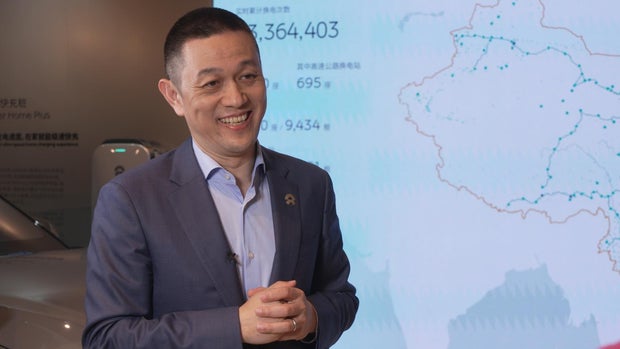
Lesley Stahl: This is— this is nice.
William Li: This is our flagship.
William Li, the CEO and founder of NIO, says its battery swap technology allows owners to swap out their depleted battery for a fully charged one in under three minutes.
William Li: Exactly it’s two-and-a-half minutes.
Lesley Stahl: Two-and-a-half minutes?
William Li: Two-and-a-half, yes. We already installed 2,200 swap stations all around China.
China is also developing a humanoid robot industry.
Lesley Stahl: Look at that.
Alex Gu: After lots of years, it’s coming true.
Alex Gu is the founder and CEO of Fourier Intelligence.
Lesley Stahl: Hi there.
Last year he launched the GR-1, his first-generation humanoid.
Alex Gu: We can do arm, he can swing the arm. Yeah, you see?
Lesley Stahl: Oh, look at the fingers. Oh my word. Can he play the piano?
Alex Gu: Yeah, future definitely it can.
Lesley Stahl: In the future.
Also in the future, he says, the robots could provide health care for China’s rapidly aging population.
Alex Gu: Maybe we can, for example, we can remote control such kind of robot to help my grandpa, for example. Yeah, I think.
Lesley Stahl: Yeah.
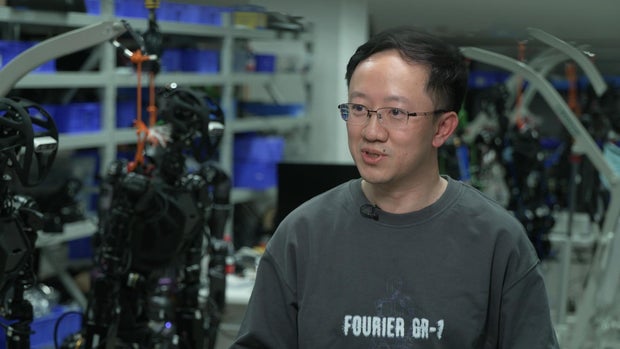
President Xi, who visited this company last year, has called for the mass production of humanoids by 2025.
President Xi Jinping, speaking Mandarin during Dec 31, 2023 speech (English translation): Some people…with employment and life…
In his annual New Year’s speech, he talked about the country’s economic woes and, for the first time, acknowledged the high unemployment rate. Still, he has laid out a long-term goal of doubling China’s economy by 2035 and surpassing the West in technology.
Nicholas Burns: Our companies and tech experts are competing on AI and biotech and quantum mathematics. All those technological advances will lead to a new generation of military technology. Our two militaries are vying for military supremacy—who’s going to be the most powerful in the most important, strategic part of the world, which is the Indo-Pacific.
Presidents Biden and Xi met in San Francisco in November in hopes of re-establishing military communications between our two countries, which China had cut off.
Nicholas Burns: I think we’re back to a more settled and stable relationship between the two countries, but it’s been a rollercoaster.
The low point, he says, was the spy balloon incident last year. But there’s also been the build up of military bases in the South China Sea, the increase of air sorties near Taiwan, and the buzzing of U.S. military planes.
Lesley Stahl: Do you see a lowering of the temperature in the South China Sea?
Nicholas Burns: No, and that’s a problem.
Lesley Stahl: You don’t?
Nicholas Burns: And then on Taiwan, following Speaker Pelosi’s visit, we’ve seen, now for 16 months, a much higher rate of Chinese both air activity and naval activity that’s very intimidating, meant to intimidate—
Lesley Stahl: And that hasn’t– they haven’t pulled back on that?
Nicholas Burns: –the Taiwan authorities. They haven’t pulled back on that. And I think ultimately, they want to become and overtake the United States as the dominant country globally. And we don’t want that to happen. We don’t want to live in a world where the Chinese are the dominant country.
Lesley Stahl: When the Cold War ended, we all thought our system had won.
Nicholas Burns: Yeah.
Lesley Stahl: You know, their system failed, our system rose up. Now he’s come back and said, “No, no, the Communist system’s the right way.” I guess we didn’t bury that after all.
Nicholas Burns: You know, it’s interesting to compare the old Cold War with this time. What distinguishes this time versus the old Cold War: Soviet Union had a strong military and nuclear weapons. It had a very weak economy, which in no way competed with ours. China’s economy is very strong. We’re dealing with an adversary, a competitor in China stronger than the Soviet Union was in the 1940s, 50s, 60s, 70s, and 80s.
Lesley Stahl: So, if that was a cold war, what are you calling this?
Nicholas Burns: It’s a competition of ideas, a battle of ideas. Our idea, America’s big idea of a democratic society and human freedom, versus China’s idea that a Communist state is stronger than a democracy. We don’t believe that. So, there’s a battle here as to whose ideas should lead the world. And we believe those are American ideas.
Produced by Richard Bonin and Mirella Brussani. Broadcast associates, Wren Woodson and Aria Een. News associate, Jessica Langer. Edited by Peter M. Berman.
.cbsnews.com

